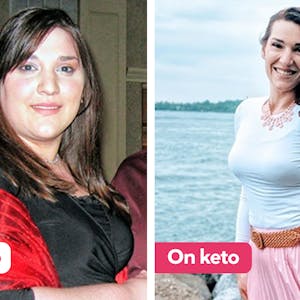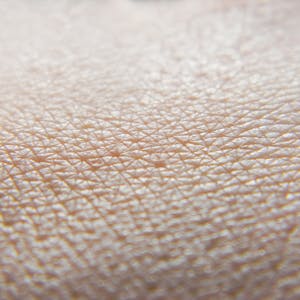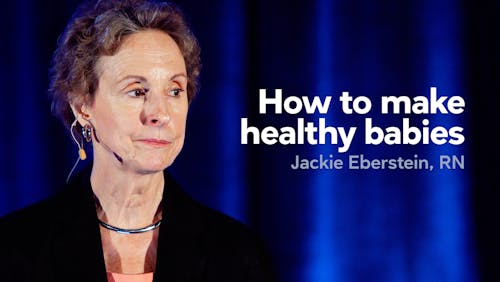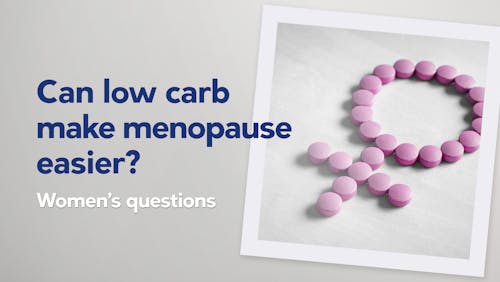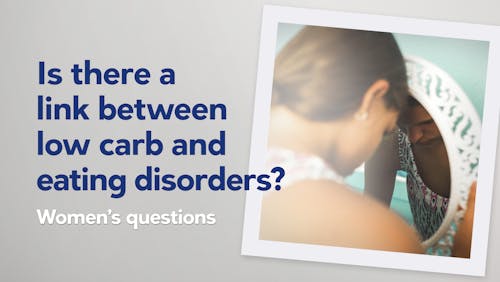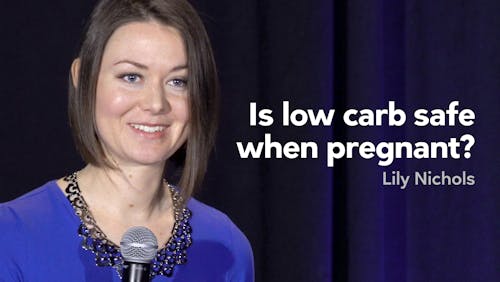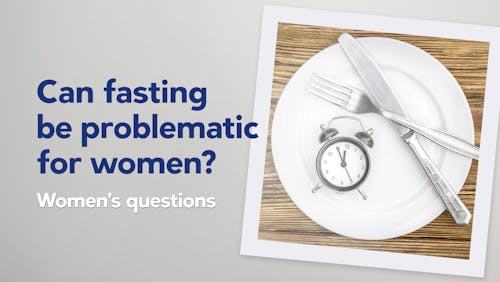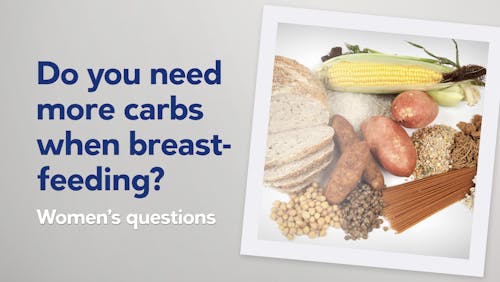Top 8 reasons to adopt a low-carb diet for polycystic ovary syndrome

Jessica – Before and after
Many people come to Diet Doctor because they are looking for help to lose weight or reverse type 2 diabetes. But did you know that almost all the symptoms of a common female condition called Polycystic Ovary Syndrome (PCOS) respond very well to a low-carb or ketogenic diet, too?
So what is PCOS? It’s a reproductive disorder that affects about 10 per cent of all women. The symptoms are upsetting: infrequent or absent menstrual periods, infertility, weight gain, acne, facial hair growth such as mustaches and sideburns, sometimes even losing scalp hair.
Blood tests almost always show insulin resistance and higher male hormones. Often the ovaries are found on ultrasound to be dotted with cysts.
Women with PCOS are typically treated with a cocktail of drugs: birth control pills, medications to stop male hair growth, the diabetes drug metformin to lower blood sugar, or sometimes medications for depression and anxiety. If they want to get pregnant, they are usually given fertility drugs to try to stimulate ovulation. At least 50 per cent of the time these drugs don’t work, paving the way for other techniques such as in vitro fertilization (IVF).



But there’s a simpler way to potentially get dramatic results: try a low-carb high-fat diet.
“Cutting carbohydrates to less than 20 total grams and boosting fat to 75 per cent of the diet rapidly restores periods, increases fertility, and greatly improves distressing symptoms like acne and weight gain,” says Dr. Michael Fox, a fertility specialist at the Jacksonville Center for Reproductive Medicine in Florida. Dr. Fox answers our members’ questions about using low-carb and keto diet to improve reproductive and metabolic issues.
I wish I had known about the low-carb high-fat diet for PCOS when I was diagnosed with the condition at age 19. It would have saved me years of frustration, sadness, infertility, and feeling that I was somehow defective as a woman.
“PCOS really undermines your self-confidence and happiness,” agrees Jessica Shotwell Walker, of Atlanta Georgia, who was diagnosed at 18 and struggled for almost 20 years with the condition. “I never felt like a ‘real girl’ until I was fully keto and my cycles finally became monthly. I felt ugly and unloveable for many, many years.” She has now maintained a low-carb ketogenic lifestyle for 10 years and all her symptoms have resolved. She is the picture of vitality and vigor. “I’ve never been happier, healthier, more athletic or more full of positive energy,” she says.
Here are eight reasons, backed by scientific research, why women with PCOS should try eating a low-carb ketogenic diet.
1. We may be genetically programmed, from ancient times, to thrive on low-carb or keto eating
PCOS is now known to be a complex genetic condition, found in all ethnic groups, that has been around for at least 150,000 years.1 But why would a disorder that impairs fertility persist across millenniums?
Genetic researchers believe that it once conferred a distinct evolutionary survival advantage to both women and their children in Paleolithic times, likely bestowing improved strength and disease resistance, better energy utilization, better spacing of children, and better ability to survive famines.2 What is different today than 100,000 years ago? Our constant high consumption of sugar and carbohydrates. That is why cutting them out may have such a dramatic impact on PCOS symptoms. Carbs, it seems, may be the wrong fuel for our finely tuned genetic engine that was built eons ago.
2. Insulin resistance and glucose intolerance improve
Despite its name, cystic ovaries are not found in all women. But almost all women with the condition – whether thin or obese – show greater insulin resistance and impaired glucose tolerance than women without the condition.3
“It is insulin that really drives the whole process,” says Dr. Fox. “And insulin release is caused by carbohydrates.” In fact, a debate is ongoing that the name should be changed to “metabolic reproductive disorder.”4 Numerous studies are now showing adopting the low-carb ketogenic diet improves insulin sensitivity and glucose intolerance among those with PCOS.5
3. Periods and fertility rapidly return and pregnancies result
Dr. Fox has been treating thousands of women with PCOS with low-carb diets for 17 years now. He notes that within two to three months of cutting the carbs, most of his patients’ periods normalize. “As we introduced the low-carb high-fat diet, we changed the metabolic picture, and the insulin levels came down, our pregnancy rates went up to 90 to 95 per cent.”
A 2021 systematic review of RCTs concluded that dietary interventions improve PCOS symptoms, and low-carb is likely the best for fertility and restoring normal menstruation.6
A 2005 pilot study on a low-carb diet for PCOS, of which Dr. Eric Westman was an author, found hormone profiles improved and two previously infertile women spontaneously conceived after adopting a ketogenic diet.7 Low-carb baby stories abound. “LCHF helped me get pregnant,” said Swedish mom Isabel Nelson, whose story we’ve previously told. In the comments, more women told of their LCHF baby successes.
Here’s a longer post on the topic:
Trying to Conceive? Try the Better Baby Diet of Beef, Butter & Bacon
4. Excess weight is lost



Jessica Shotwell Walker lost 65 lbs (29 kg) and has kept it off for 10 years, see the image of her playing tennis to the right. I lost 10 lbs (5 kg). A number of studies are showing removing carbohydrates and replacing them with high-fat foods is the most promising treatment for obesity in PCOS.8
5. Acne improves
One of the upsetting features of PCOS is a higher tendency to acne that arises not only in adolescence but persists into adulthood. In recent years, numerous studies have shown reducing the glycemic load (i.e cutting out carbohydrates that rapidly convert to sugar) greatly improves acne, whether people have PCOS or not.9
While so far studies specifically focusing on treating the acne in PCOS using carbohydrate restriction are very limited, a number of testimonies10 on Diet Doctor attest to dramatic improvements in skin condition by adopting a low-carb ketogenic diet. “For the first time in 15 years I am free of acne,” said Laura. So what do you have to lose by trying the keto diet? Maybe the breakouts.
6. Anxiety and depression may ease
With an increased propensity for weight gain, acne, facial hair growth and infertility it is little wonder that women with PCOS tend to have greater incidence of anxiety and depression than women without the condition.11 Are the mood issues emotional in response to the symptoms or actually caused by sub-optimal nutrition for our genetic type impacting key receptors in the brain?
While research is still very limited around the relationships between our genes, the foods we consume, and our mental health,12 low-carb ketogenic experts report anecdotal evidence that anxiety and depression lift among their patients adopting a low-carb ketogenic diet. Shotwell Walker agrees. “I have never felt happier.”
7. Bulimia may improve or resolve
Many studies have found that the incidence of bulimia is greatly increased among women with PCOS. In the past this finding was used to dismiss women with PCOS as having psychiatric problems that contributed to their reproductive disorder, concluding that the bulimia came first and the PCOS later.13 But what if the genetic intolerance to carbohydrates in a carb-rich world triggers bulimia among PCOS women?
The theory is that genetic inability to handle an abundance of glucose and carbs fuels a cycle of insulin and glucose spikes and crashes, which fuel carbohydrate cravings and purgings.14 It’s as if the body is desperate to get the nutrition it needs for its optimal performance, leading to binging and then purging when the wrong foods (high levels of sugar and carbohydrates) are consumed.
Scientific research is lacking, but anecdotal evidence shows binge-eating disorders can be helped by the ketogenic diet, which reduces cravings and greatly reduces the bulimic tendencies. “With keto, you lose your cravings for starches and sugar,” posted one woman in a bulimia discussion thread online.15 “That is such a relief!”
8. Improved pregnancies and reduced risks of health problems after menopause with ketogenic diet
Most of the focus on women with PCOS is in the adolescent and early adult years when infertility, acne and weight gain are the prominent features. But women with PCOS who get pregnant have much higher rates of complications during pregnancy including gestational diabetes (a disorder of carbohydrate intolerance), pre-eclampsia (high blood pressure during pregnancy) and bigger babies over 9 lbs (which are a risk for Caesarean deliveries and an independent risk for future diabetes.)16
Moreover, women in menopause, who had PCOS, have higher rates of cardiovascular disease, high blood pressure, and type 2 diabetes.17 Research is limited, but the entire profile of PCOS suggests limiting carbohydrates and adopting a low-carb ketogenic diet may help with all these related problems, no matter what the age and stage of PCOS in affected women. “I know I have to stay on a ketogenic lifestyle for life. My problems rapidly return if I return to eating carbohydrates,” says Shotwell Walker.
And here is a surprising bonus: male relatives may benefit, too
Think that only women have the genes? Not so. Recent genetic findings show that male relatives – fathers and brothers — of women with PCOS also have a tendency to increased insulin resistance, type 2 diabetes, and cardiovascular disease.18 All of these conditions improve on a low carb ketogenic diet.
An interesting finding is that the only apparent outward symptoms of male relatives of women with PCOS are early male pattern baldness before age 30 and excessive body hair.19 Will adopting a ketogenic diet help slow male pattern baldness and halt the furry look among men with the PCOS genes? It’s too soon to tell.
—
Anne Mullens
Number 9?
There’s a potential ninth benefit: Happy muscles running on fat
More
Infertility, PCOS and the IDM program
How to reverse PCOS with low carb
Stories
Videos
Earlier
“I No Longer Crave Sweets or Let Food Control Me”
New Meta-Analysis: Low Carb Can Be an Effective Treatment for Infertility
Journal of Clinical Endocrinology and Metabolism: Perspectives in Polycystic Ovary Syndrome: From Hair to Eternity ↩
Fertility and Sterility: Polycystic Ovary Syndrome: An Ancient Disorder?
Reproductive BioMedicine Online: An Evolutionary Concept of Polycystic Ovarian Disease: Does Evolution Favour Reproductive Success Over Survival? ↩
-
The Journal of Clinical Endocrinology & Metabolism: Glucose Intolerance in Polycystic Ovary Syndrome—A Position Statement of the Androgen Excess Society ↩
Endocrine Web: It’s Time to Rename Polycystic Ovary Syndrome ↩
Yes, a Low-Carb Diet Greatly Lowers Your Insulin
Nutrition and Metabolism: The Effects of a Low-Carbohydrate, Ketogenic Diet on the Polycystic Ovary Syndrome: A Pilot Study ↩
Frontiers in Endocrinology 2021: Dietary modification for reproductive health in women with polycystic ovary syndrome: A systematic review and meta-analysis [strong evidence] ↩
Nutrition and Metabolism: The Effects of a Low-Carbohydrate, Ketogenic Diet on the Polycystic Ovary Syndrome: A Pilot Study ↩
Minerva Endocrinologica: The Effect of Dietary Carbohydrates in Women with Polycystic Ovary Syndrome: A Systematic Review ↩
- Journal of the American Academy of Dermatology: Dietary Glycemic Factors, Insulin Resistance, and Adiponectin Levels in Acne Vulgaris
- American Journal of Clinical Nutrition: A Low-Glycemic-Load Diet Improves Symptoms in Acne Vulgaris Patients: A Randomized Controlled Trial
- Acta Dermato-Venereologica: Clinical and Histological Effect of a Low Glycaemic Load Diet in Treatment of Acne Vulgaris in Korean Patients: A Randomized, Controlled Trial
- “For the First Time in 15 Years I’m Free of Acne”
- Maria Got Rid of Acne and 44 Pounds with LCHF
- Acne (and IBS) Vanished with a Diet Change
Neuropsychiatric Disease and Treatment: Polycystic Ovary Syndrome and Mental Disorders: A Systematic Review and Exploratory Meta-Analysis ↩
- Biological Psychiatry: The Antidepressant Properties of the Ketogenic Diet
- Nutritional Neuroscience: Epigenetics, Nutrition and Mental Health. Is There a Relationship?
- The Proceedings of the Nutrition Society: Recent Advances in Nutrition, Genes and Brain Health
Journal of Psychosomatic Research: Binge Eating and Menstrual Dysfunction ↩
Dr. Briffa: Why Bulimia Is Not All in the Mind, and the Dietary Approach That Can Put a Stop to This Condition ↩
Human Reproduction Update: Pregnancy Complications in Women with Polycystic Ovary Syndrome ↩
Climacteric: Polycystic Ovary Syndrome and Metabolic Syndrome: The Worrisome Twosome? ↩
Northwestern Medicine: PCOS Research Points to Gene Defect
Medical Hypotheses: Polycystic Ovary Syndrome in Men: Stein-Leventhal Syndrome Revisited ↩
Endocrine Regulations: Premature Androgenic Alopecia and Insulin Resistance. Male Equivalent of Polycystic Ovary Syndrome? ↩


